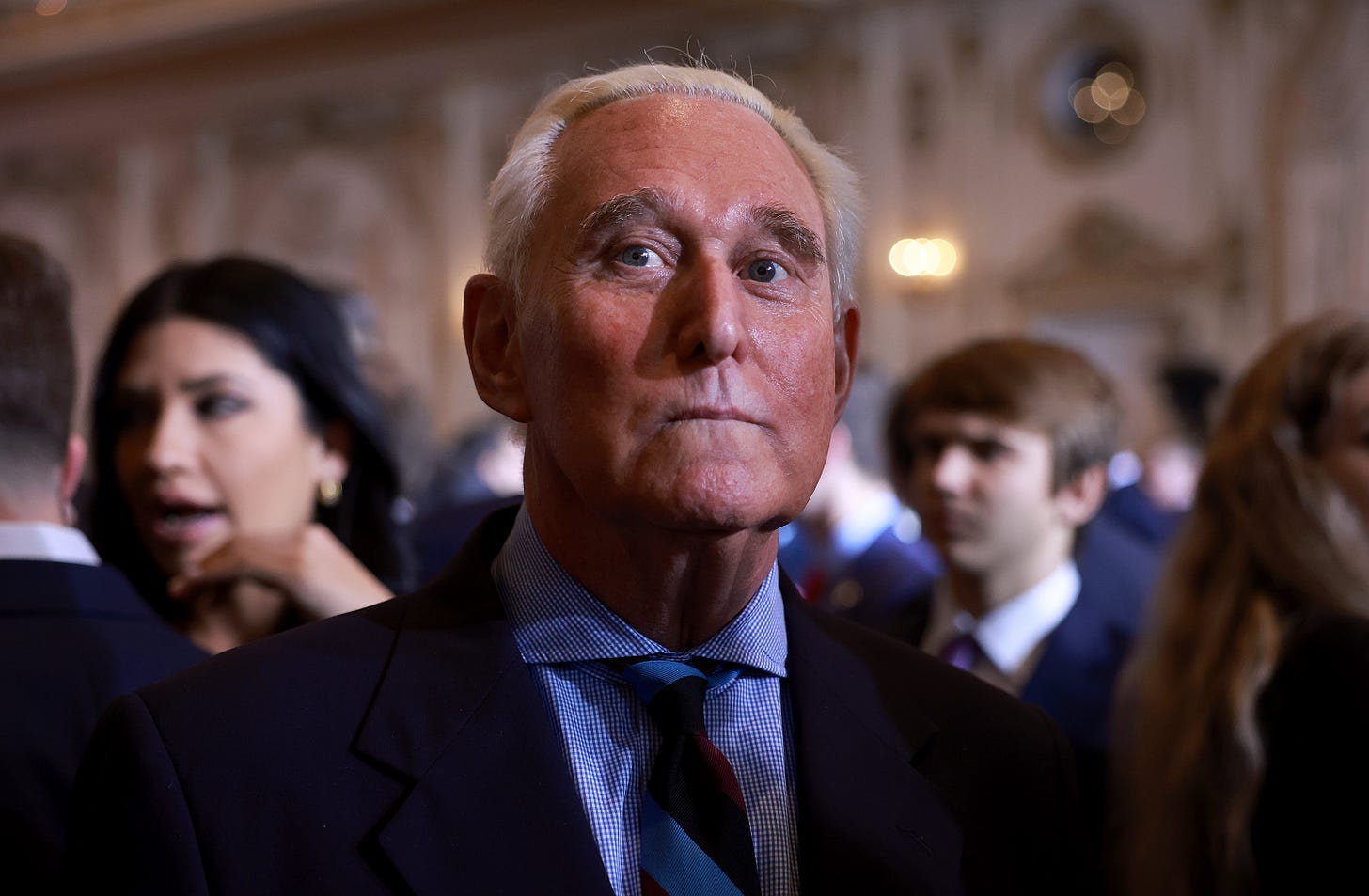
Roger Stone and the Key to Trump’s Evangelical Support
Following a conversion experience, the Trump adviser has found a new audience in a movement of MAGA prophets.

TRUMP ADVISER AND MAD-HATTER political operative Roger Stone made a strange declaration at a recent gathering of pastors at the Trump National Doral resort in Miami, Florida: He claimed that he was the subject of a modern prophecy about a “stone” that would kill a giant and that he is now a “soldier in the army of the Lord.” He went on to apocalyptically proclaim that American politics today is
not just a struggle between Republicans and Democrats, or between liberals and conservatives. This is a fight between light and dark. This is a struggle between good and evil. This is an epic fight between the godly and the godless, and we dare not lose, because, should we lose, America will step off into a thousand years of darkness.
For those who may have intermittently followed Stone’s oddball, cynical career at the heart of modern Republican politics, this declaration of piety might sound odd and new. But Stone’s rhetoric reflects an identity shift he has undertaken over several years: Though he was raised Catholic, Stone claims he experienced a born-again awakening following a conversation with the evangelist Franklin Graham at a January 2020 revival meeting. He’s been sharing this story for years now, including in an interview last March with Charisma magazine, an influential publication among Charismatics and Pentecostals. Stone now identifies as a “nondenominational Christian.”
As a religion scholar who has not spoken to Roger Stone personally, I will refrain from speculating on the sincerity of his recent conversion and new faith commitments. However, I will observe that he made very similar Manichean and apocalyptic remarks on January 5, 2021 at a rally in Washington, D.C. to stir up the Trump-supporting crowds for the next day’s actions. Indeed, more important than knowing the inner workings of Stone’s heart and mind is recognizing the context in which he keeps making these comments, their political function, and the subset of evangelicals that he is addressing through them.
EVANGELICALISM IN AMERICA is a big, complicated movement that includes, depending on how you define the category, between 13.6 percent and 25.4 percent of the U.S. population. That’s somewhere between 45 and 84 million Americans, with a host of theological, political, and identity currents among them. Much has been written over the past eight years about the American evangelical attachment to Donald Trump, but a lot of this commentary has missed the central evangelical demographic at the heart of Christian Trumpism.
To be clear, evangelicals (particularly white evangelicals) gave major electoral support to Trump in 2016 and 2020. But, if you look closely at the Evangelical Advisory Board, an inner circle of religious advisers Trump assembled while in office, and his most loyal Christian proponents who were willing to show up in force on January 6th, a striking pattern emerges: Trump’s most ardent Christian advocates are nondenominational Charismatic evangelicals, a group sometimes referred to by academics as Independent Charismatics or Independent Network Charismatic Christians.
Independent Charismatics are evangelical Christians who attend nondenominational churches or, alternatively, who may infrequently or even regularly attend a more typical denominational church while giving their real spiritual attentions and enthusiasm to online prophecy ministries and preachers. Independent Charismatics emphasize a modern, supernaturally driven worldview where contemporary prophets speak directly for God; miracles are everyday experiences; menacing demonic forces must be pushed back through prayer; and immersive, ecstatic worship experiences bolster Christian believers’ confidence that they are at the center of God’s work in the world. These believers are country cousins to the more denominationally aligned Pentecostal evangelicals, though the lack of denominational oversight and the freewheeling nature of the independent Charismatic sector leaves them more vulnerable to radicalization.
Sociologist Paul Djupe has conducted surveys in the last couple of years that yielded two important findings concerning the beliefs of independent Charismatics. Belief in modern-day prophecy—and particularly, belief in prophecies about Donald Trump—was both strongly correlated with belief in Trump’s claims of election fraud and a major accelerant for extreme political views, including an openness to supporting violence or lawbreaking in the pursuit of political goals. This should not surprise anyone too much: If you believe—truly believe—that God is intervening directly in American politics and anointing presidents, then democracy and the will of the people must logically be secondary and subordinate to the will of God.
I have argued in an audio-documentary series that independent Charismatic prophecies, theologies, and leadership networks were at the molten core of Christian mobilization and participation in the January 6th Capitol insurrection. Hundreds of these highly politicized Charismatic prophets confidently proclaimed during the 2020 election cycle that God had revealed to them that Donald Trump would be reelected, as a handful had also done in the lead-up to his election in 2016. A number of these prophets even showed up leading Christian prayer and worship in the crowds surrounding the Capitol on January 6th. Moreover, my research has uncovered evidence that some of these very same independent Charismatic prophets and spiritual-warfare leaders were taking meetings in the White House and apparently coordinating strategy with top Trump Administration officials in the lead-up to the riot.
After January 6th, this prophecy-obsessed segment of Christianity did not go away; it was a prominent part of Doug Mastriano’s coalition during his failed bid to become governor of Pennsylvania last fall, and they strongly backed Kari Lake in her bid to become Arizona governor, as well. Rather than diminish in the intervening years, the movement’s dynamics have become so extreme and so bound up with Donald Trump that even some concerned leaders within the independent Charismatic world have started to throw red flags. One even compared contemporary politicized prophets to the Christians who used theology to justify Nazism in Germany. “The people that are committed to prophesying what they’re prophesying are so ignorant of [the Nazi precedent] that they’re rushing headlong into that very thing,” said Bishop Mark Chironna in a podcast interview about prophecy and Christian Nationalism. These types of concerns even led a group of 65 independent Charismatic leaders to issue a statement last year condemning the use of modern prophecy for partisan political ends. The statement received several hundred further signatures from concerned Charismatics.
BUT A FEW HUNDRED DISSENTING BELIEVERS do not wield the power and influence of the millions who still follow the prophets of MAGA. More than two years after January 6th, it is these same independent Charismatic networks, same theologies, and same prophecies that Roger Stone is appealing to with his recurring declarations. When he testified to his prophetic destiny at Trump’s Doral resort, Stone was speaking at a joint event sponsored by a pair of Charismatic-facing political organizations: the newly formed Pastors for Trump and the ReAwaken America tour. In case you’ve missed the ReAwaken America tour, it’s a traveling roadshow of QAnon conspiracy theorists, COVID denialists, and Charismatic pastors and prophets. One of its headliners is Trump’s short-lived national security advisor Michael Flynn, now an arch-conspiracist. Another speaker at the event appeared to claim we’re heading for armed combat against evil mermaids.
In his jeremiad, Stone invokes a prophecy by the South African prophet Kim Clement, who died in 2016. Clement is hardly a household name in broader American evangelicalism, but within the independent Charismatic ecosystem, Clement is a modern-day prophet of global renown. His followers credit him with being one of the first of the Charismatic prophets to “predict” Trump’s election, which he did all the way back in 2007. (He actually said “Trump shall become a trumpet,” which hardly seems like a precise foretelling, but a bit of figurative leeway is built into almost every prophetic word.) Independent Charismatic leaders I have interviewed have pointed to Clement’s prophecies about Trump as some of the most convincing proofs of God’s anointing on the thrice-married, impious real estate mogul. Roger Stone clearly knows the power of these invocations and their importance for his new independent Charismatic friends, and he has latched on to a similarly elliptical Clement prophecy from 2014 about a “simple stone” that will be used to kill a giant—an obvious reprisal of the David and Goliath scenario—and claimed that the “simple stone” is himself.
Stone has made this claim before. I have found at least a dozen instances of him appearing on Christian Nationalist and independent Charismatic podcasts, livestreams, and conferences since his apparent 2020 born-again experience. In many of these appearances, Stone uses almost identical phrasing, similar apocalyptic imagery, and similar appeals to the prophecies of Clement and other Charismatic prophets. Michael Flynn, who like Roger Stone was raised Catholic, has also insinuated himself—particularly through the ReAwaken America tour—into these same prophecy and Charismatic celebrity networks, which contributed directly to the violence and chaos that threatened our democracy just a couple years ago.
So what does it signal that some of Donald Trump’s closest and most strategically savvy allies and advisers—who, as Stone makes clear, are not famous for their religiosity—are now building credibility and influence within these extremist independent Charismatic networks? I think it shows a deep awareness within Trump’s political operation that, when it comes to the MAGA coalition, not all evangelicals are created equal, especially given the “disloyalty” he claims some have shown him by not endorsing his new presidential bid. Independent Charismatics were a major driver of evangelical support for Trump in 2016, and Charismatic prophets were a central validating and radicalizing force in the turbulent aftermath of the 2020 election. I wager that if—or when—we see another outbreak of semi-organized Christian political violence in the United States, it will originate in these militant prophecy-bolstered segments of evangelicalism, just as it did last time. Roger Stone and Michael Flynn seem to think so, too.
















